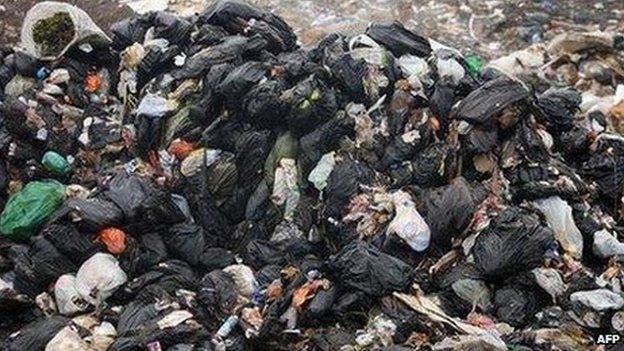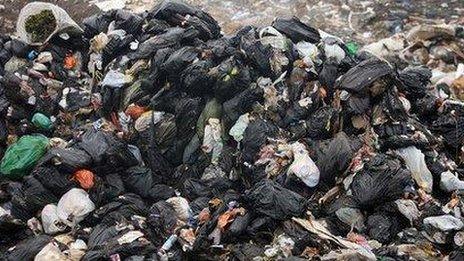River Faughan at risk of serious pollution from dump
- Published

Plastic bottles, bin bags, food and wood were found at the Campsie site along with construction site material
A swimming pool's worth of contaminated liquid could leak into a County Londonderry river, experts have warned.
A leak could have serious implications for the River Faughan, the government experts said.
The warning follows the discovery in 2013 of one of the worst ever pollution cases in Europe at an illegal dump outside Derry.
Around 1.5m litres of waste liquid and water has already been removed from the site.
"The environment impact will be huge. We need to make sure this is controlled so we can protect the water supply in this area," said Mark Livingstone, head of waste management at the Northern Ireland environment agency,
The experts said that although the liquid has been contained so far, huge pools are reappearing at a fast rate and the wet winter season will only increase the risk of run-off.
"Leachate [waste liquid that drains or leaches from a landfill] contains very, very high amounts of ammonia so that will kill fish instantly. It's dry and the problem will be in the winter where there will be further problems, fears and concerns," said scientific officer Stephen McLaughlin.
'Failed'
So far £800,000 has been spent on the clean-up operation at the Campsie site where 5,000 tonnes of waste, and 2,500 tyres has been removed.
Gerry Quinn from River Faughan Anglers said the "river has been failed."
The Mills report, published in December, found criminality was widespread in the waste industry in Northern Ireland with at least some involvement by organised crime.
The Department of Environment (DoE) commissioned an independent report in June 2013 after 516,000 tonnes of waste was found at Campsie near Derry.
The report, by former Welsh Environment Agency director Chris Mills, recommended that the entire waste system should be looked at to see how criminals exploit it, and said regulation should be more rigorous and robust.
It estimated that cleaning up illegal dumps that had already been discovered could cost £250m.
- Published8 April 2014

- Published12 March 2014

- Published18 December 2013
